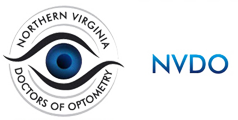As we observe Glaucoma Awareness Month, knowing more about this serious eye condition is essential. Often dubbed the “sneak thief of sight,” glaucoma quietly damages your optic nerve, often without any warning signs. If left unchecked, it can lead to irreversible vision loss. But while it’s a serious issue, eye care experts from Northern Virginia Doctors of Optometry emphasize early detection and management more than prevention.

What Is Glaucoma?
Glaucoma is a group of eye conditions that can lead to irreversible vision loss by damaging the optic nerve, which transmits visual information from the eye to the brain. The most common type is open-angle glaucoma, which is characterized by a gradual increase in intraocular pressure (IOP) that can damage the optic nerve over time. However, there are other types, such as angle-closure glaucoma, where a sudden increase in IOP can occur.
Glaucoma is often referred to as the “silent thief of sight” because it typically progresses slowly and without noticeable symptoms until the later stages. Symptoms aren’t always immediate but can include blurry vision or even vision loss in severe cases.
Risk Factors for Glaucoma
While glaucoma can affect anyone, certain factors increase the risk. These include age (those over 60 are at higher risk), race (it’s more common in African Americans), high eye pressure, family history, and certain medical conditions like diabetes. Understanding these factors enables individuals to monitor their eye health proactively. Meeting an optometrist for regular check-ups is a practical step for timely detection and control.
Ways to Manage and Slow Down Glaucoma Progression
While it’s not always possible to prevent glaucoma entirely, certain lifestyle choices and proactive measures can significantly reduce the risk of developing this eye condition. Here are some strategies to consider for glaucoma prevention:
- Regular Eye Exams. Early detection is key to managing glaucoma. Comprehensive eye exams, including measurements of intraocular pressure and optic nerve evaluations, can identify signs of glaucoma before noticeable symptoms develop.
- Healthy Lifestyle Habits. A well-rounded lifestyle positively impacts eye health. Regular exercise, a balanced diet rich in antioxidants and refraining from smoking contribute to overall well-being and potentially reduce the risk of glaucoma.
- Managing Intraocular Pressure. Elevated intraocular pressure is a primary risk factor. Prescription medications can help manage IOP effectively. Adherence to prescribed treatment plans, as directed by an eye care professional, is essential for controlling this aspect of glaucoma.
- Eye Protection. Preventing eye injuries is vital to minimizing the risk of glaucoma. Wearing protective eyewear during activities with potential eye trauma can safeguard against injuries that might contribute to glaucoma development.
- Limited Caffeine Intake. While more research is needed, some studies suggest a potential link between excessive caffeine consumption and glaucoma risk. Moderating caffeine intake may be considered part of a holistic approach to eye health.
- Managing Other Health Conditions. Conditions like hypertension and diabetes can impact glaucoma development. Regular medical check-ups, adherence to prescribed medications and lifestyle modifications are essential in managing these conditions and, in turn, supporting eye health.
We Can Help
Awareness, early detection and effective management are your best defenses against glaucoma. As eye care experts in Alexandria, VA, we at the Northern Virginia Doctors of Optometry are here to help you safeguard your vision. From comprehensive eye exams to specialized treatments, including post-op care following LASIK eye surgery, our dedicated team ensures the timely detection and effective management of glaucoma.
If you have any concerns about glaucoma or overall eye health, give Northern Virginia Doctors of Optometry a call at one of our branches: (703) 660-9494 (Alexandria, VA), (703) 413-1400 (Crystal City), (703) 522-7676 (Clarendon), (703) 573-1200 (Falls Church, VA) and (703) 467-9080 (Reston, VA). You can also fill out this contact form to reach us.



























